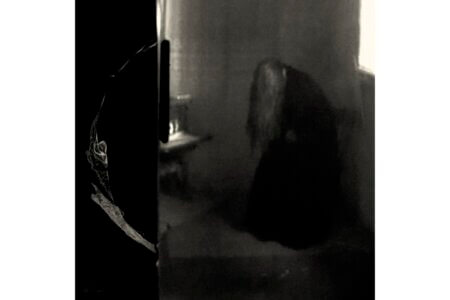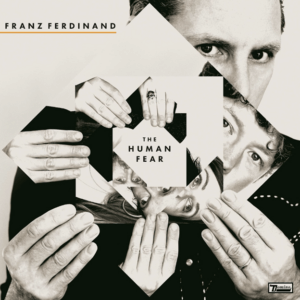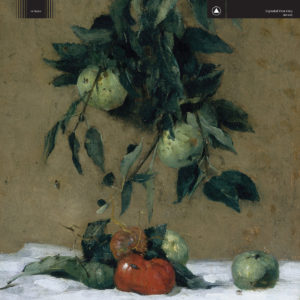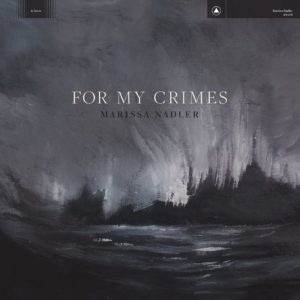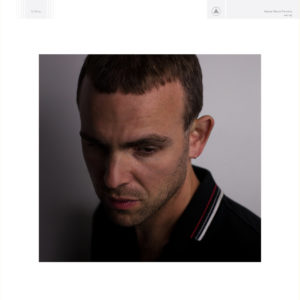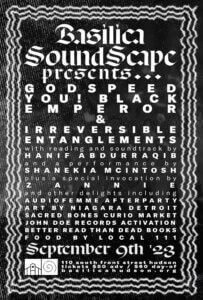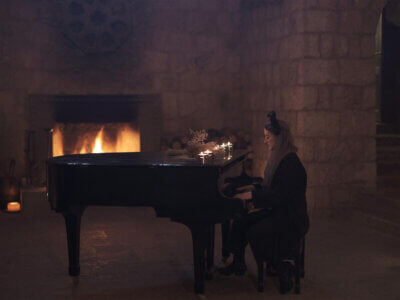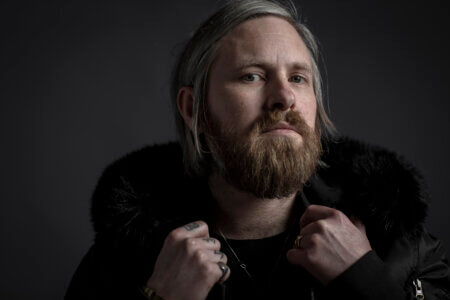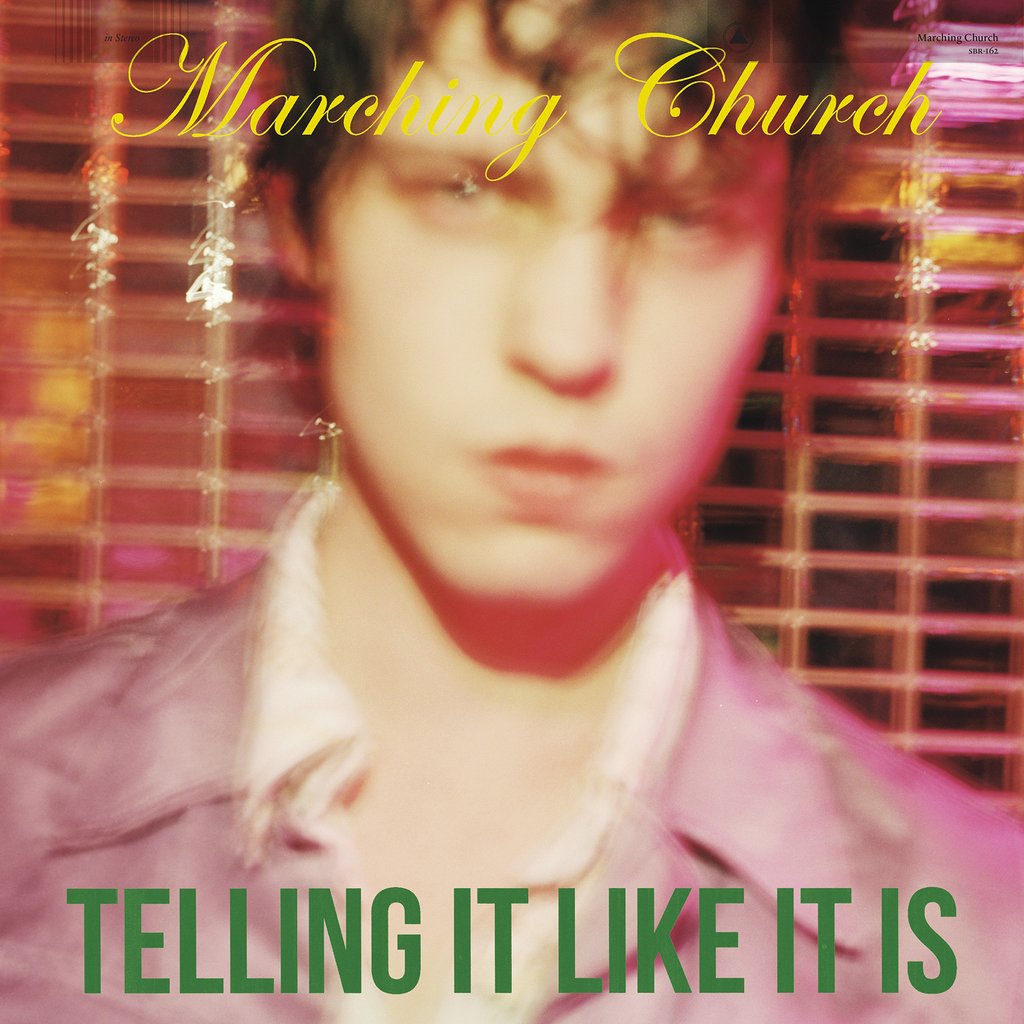
8.1
Telling It Like It Is
Marching Church
Back in 2011, a blog post accusing the Danish band Iceage of deploying “Chic Racism” and fascist imagery started gaining traction. The accusation became a major talking point for their debut. The post was highly detailed and pulled from subtle references – Germanic symbols, a tattoo one of the band members had, a weird zine put out by the band’s lead singer, Elias Bender Rønnenfelt. The forensic approach made the evidence seem a lot more concrete than it really was. The fascism question became a staple in interviews with the band. Regardless of Iceage’s attempts to address the accusation that their music was coded with fascist imagery – explanations that they were, in fact, left-leaning and concerned with Europe’s surge in far right rhetoric (also, their drummer is Jewish) – the critique has carried over to Rønnenfelt side project, Marching Church.
Revisiting the fascism rumour, it’s easy to see that going after Iceage’s iconography was a shortcut for articulating anxiety over Rønnenfelt’s loftier lyrical themes. Iceage formed in 2008, when the band members aged roughly 17 years old. At that time, the band was concerned with rousing topics like brotherhood, unity, and blood. The early material was great, but it was also a little half-baked. Rønnenfelt also sang in English, his second language, and a lot of reviewers gravitated towards his vague exoticism. The band was an emergent force in Copenhagen’s punk and noise scene, which was just starting to get acknowledgment outside of Scandinavia. The scene was beginning to be cohesive and they were starting to get hype – the lyrics spoke to that.
Marching Church, for its part, began as Rønnenfelt’s solo project, but grew quickly to include members from Lower, Puce Mary, Sexdrome, and Hand of Dust – all Copenhagen band’s from around that scene. Marching Church’s latest album, ‘Telling It Like It Is’, gives some good insight into solving the question of Rønnenfelt’s fascist sympathies. The album sees Rønnenfelt come into his own as a bandleader – autonomous, obnoxious, wavering between naked self and crafted persona.
As a solo project, Marching Church has always been a way of channelling a more detailed, focused, and perhaps more self-indulgent, writing and performance style, that initially had trouble getting its sea legs in Iceage. Marching Church’s focus is egos and character studies. Notably, Rønnenfelt has commented about how his song-writing changed as his English skills improved. There’s just a lot more going on lyrically: love songs, trauma, phenomenological accounts of the city. Like Iceage’s last two albums, Marching Church is a lot more layered and introspective. It’s Rønnenfelt exploration of depravity and excess, fame and performance.
For all the talk of fascist aesthetics, Rønnenfelt’s lyrical content after his first album with Iceage has been less about collective force, and more about the experience (and absurdity) of self-aggrandizement. Musically, Marching Church has surged towards decadence – they’re a multi-instrumental, jazzy, and improvisational. Short of the band performing “The Sound of Music”, the band couldn’t offend Nazi sensibilities any more than it already does. Rønnenfelt commands the energy of the improvisation, huffing and moaning through brass filled free jazz. He’s not galvanizing support for any dictators, he’s exposing the rawness of self and playing out a burlesque parody of the strutting James Brown in all of us.
Compared to early Iceage, there’s been a dephysicalization of the music as well. Replacing the wild punches and bloody stage performances is a slurry sort of mind game. The force of the music remains just as intense, but it has risen through the body and refined into an heady aura. Promo for this album has stressed its compositional cohesion. In August, Marching Church was commissioned by the Metropolitan Opera for a multi-media performance at New York’s National Sawdust+ concert hall. It would be a stretch to call this music operatic, but standout tracks on the album like “Heart of Life”, “Inner City Pigeon”, “2016”, and the closer, “Calenture” suggest there’s a purity of vision here.
We might wonder why it’s been so hard for Rønnenfelt to shake the rumour of fascist tendencies. Why does the self-obsessed quality of his music lend itself so well to a political reading? Marching Church’s excess is never just excess. It’s tuned to deeper and more lasting – a meditation on experience, persona and self-making. It’s Rønnenfelt most mature project yet.
Review by Josh Gabert-Doyon
Latest Reviews
Tracks
Related Albums
Related News
Advertisement
Looking for something new to listen to?
Sign up to our all-new newsletter for top-notch reviews, news, videos and playlists.
